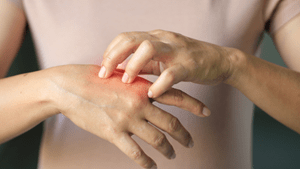
Dry, cracked hands are a common affliction during the winter months. Your hands are exposed to dry air causing your skin to crack, peel, and in serious cases, bleed. But there's another reason your hands may be drier than usual this winter.
“Unfortunately, washing your hands and using hand sanitizer also causes dry skin,” explains Beth Lertzman, MD, Dermatologist for Rochester Regional Health.
Dr. Lertzman is board certified in Dermatology and Dermatologic Surgery and is a diplomate of the American Board of Dermatology and the National Board of Medical Examiners.
“When water comes in contact with the skin it rinses off the skin’s natural oils, and when chemicals in hand sanitizer evaporates, your hand’s natural oils go too.”
The spread of COVID-19 throughout many regions of the country has increased the focus on handwashing and hand sanitizing. But there are things you can do to treat your hands while still maintaining proper hand hygiene.
Emollients are substances that soften and moisturize the skin and decrease itching and flaking.
If dry, cracked skin persists and goes untreated, it can cause an infection. Emollient cream is the best way to treat dry skin.
“You can never put too much lotion on your hands,” Dr. Lertzman says. “Lotion locks in moisture and keeps your hands hydrated, preventing infections and serious damage.”
Dry skin is the most common among older adults. Seniors should take extra precaution to moisturize their skin because they are more prone to skin problems like dryness or irritation.
If dry skin persists, consult a dermatologist, says Dr. Lertzman.
“A dermatologist can help work through your medical history and health to find potential causes of eczema, which is the medical term for any dry skin. They also provide treatment options.”
Understanding the cause of your dry skin can give insight into the changes in behavior that will prevent or reduce symptoms.
Dr. Lertzman doesn’t recommend using foot cream as a substitute for hand lotion.
“Most foot creams have additional ingredients that could be problematic for your hands and may cause irritation or allergic reactions.”
If you don’t have hand lotion nearby, body lotion is a better substitute than foot lotion.
The sun not only feels good on your skin, but it can help treat dry skin in a controlled environment with protection.
Sunlight can trigger the release of compounds in your skin that help get rid of harmful bacteria or viruses on the surface. Spending some time in the sunlight with the right skin protection can help reduce dry, cracked, and irritated skin.
“Dermatologists try to replicate the effects of sunlight as treatment with phototherapy, or light therapy,” Dr. Lertzman says. “The lights use UV rays to treat a variety of skin disorders.”
Too much exposure to the sun can cause skin cancer, and unprotected exposure to the sun is dangerous.
Dr. Lertzman recommends Neutrogena Norwegian Formula and CeraVe hand creams for dry or cracked hands.
She says if these measures don’t help treat your dry skin, get in touch with Dr. Lertzman’s office to schedule a consultation via telehealth or video conferencing.